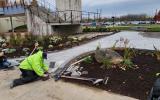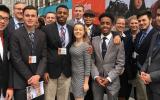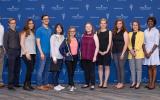Leadership Development

Community colleges are complicated environments impacted by precarious funding models, population shifts, burgeoning enrollments of students with nonacademic barriers to success, and more. An institutional climate can easily become volatile, uncertain, complex, and ambiguous (VUCA). In 1985, Warren Bennis and Burt Nanus’s Leaders: Strategies for Taking Charge, “emphasized the need for leaders to be adaptable, comfortable with uncertainty and ambiguity, and capable of navigating complex environments” (VUCA-WORLD, n.d., para. 3). In 1987, the U.S. military coined the term VUCA (Wright, 2023),...

The Model United Nations (UN) program is extremely popular throughout the United States and globally, with hundreds of thousands of students from all levels of education participating every year (United Nations, n.d.). This UN simulation enables college students to engage in and learn about international political issues and the UN while developing their communication, deliberation, leadership, and debate skills. According to National Model United Nations (NMUN) (n.d.),
Cooperative, hands-on, experiential learning allows students to confront a range of topics with the perspective of their...
Tags:

According to Inc. magazine (Curtain, 2017), the number one skill that high paying employers want in employees is the ability to solve complex problems. At Wake Technical Community College in Raleigh, North Carolina, we are striving to help students develop problem-solving skills with the support of staff and faculty across the college through Student Applied Benchmarking (SAB). Students in this program design solutions to problems with the help of college employees. The culmination of this collaborative effort is the SAB Showcase, an event that provides students with the opportunity to...

The academic success outcomes of men of color remain deficient in community colleges compared to other student groups (Valliani, 2015). While many men begin their educational journey at community colleges, most African American and Latino men do not reach degree completion (Center for Community College Student Engagement, 2014). Men of color often report that they feel unwelcome in college environments because of negative stereotypes associated with their physical appearance and challenged by academic unpreparedness and financial stress (Gardenhire-Cooks, Collado, Martin, & Castro, 2010;...
Tags:
May
2016
Arapahoe Community College (ACC), in conjunction with WorldDenver, hosted an 18-person panel of ambassadors from the U.S. Department of State’s International Visitor Leadership Program on Friday, Oct. 9, 2015. This endeavor was sponsored by the ACC Foundation.
The ambassadors were on campus to examine the community college business model, and, in particular, ACC’s role in facilitating business and industry partnerships through the College's Business Department (initiative to provide website/social media assistance to Denver-based Mi Casa clients) and Automotive Service Technology Program (on-...
Tags:

Reimagining the traditional face-to-face, lecture-based instructional model is at the heart of academic transformation in higher education, and faculty development is central to this change. Getting faculty to want to modify how they teach will enable grassroots experimentations to gain traction and inspire systemic change. Yet this process first requires faculty developers to recognize and support the affective dimension of teaching and learning and, in turn, experiment with more human-centered approaches. Expect it to be messy.
Recognizing Faculty Culture
Creativity and risk-taking in the...
Tags:










